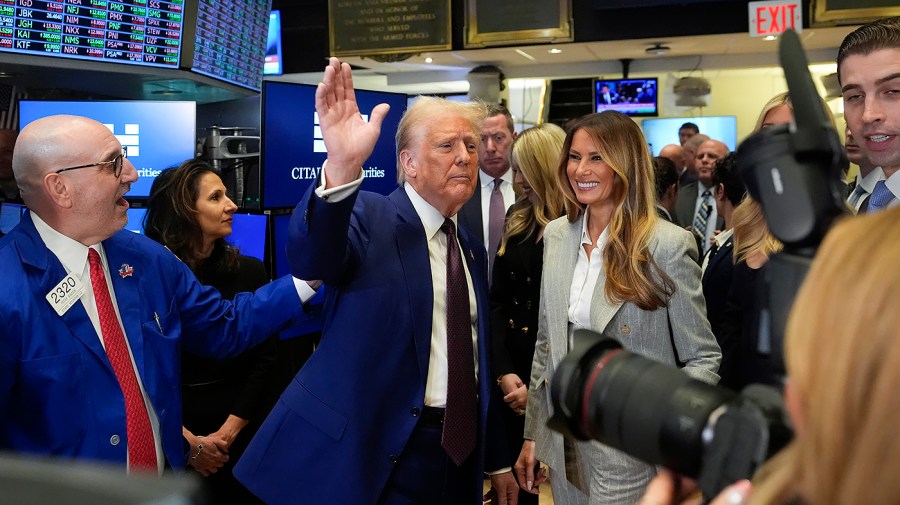
Republicans are considering doing away with one of Wall Street’s favorite tax breaks at the encouragement of President Trump, one that has long enjoyed Republican support and that could put up yet another obstacle on the road to a tax bill.
The tax break on carried interest — often called the carried interest loophole — allows the managers of investment funds such as private equity firms and hedge funds to count their income as capital gains and thereby have it be subject to a lower tax rate.
The tax rule, which has been debated by lawmakers for more than a decade and has come within a hair’s breadth of getting canceled in previous legislative fights, would affect compensation levels at some of Wall Street’s most powerful firms.
Republicans say that canceling the tax break would improve the public perception of their tax law, which includes many tax breaks for business owners and other taxpayers at the top end of the income spectrum.
“[Trump] thinks it’s a little unfair that one sector of industry gains a lot by using [carried interest] as part of their income and paying lower capital gains. President Trump doesn’t want to see anything perceived as unfair. Certainly for the wealthy, he wants to make sure that all of America gets the benefit of this tax bill. And I agree with him,” Rep. Dan Meuser (R-Pa.) told The Hill.
Rep. Rick Allen (R-Ga.) said that nixing carried interest would help to break the image of Republicans as advancing the interests of America’s richest taxpayers.
“We get accused of just looking after the wealthy — and this would include the wealthy,” he said. “With the momentum in the country, I don’t think folks will mind paying a little more to make sure we get this done.”
Carried interest is controversial because it allows the income of a hedge fund or a private equity firm, which usually pass their tax bills on directly to their owners, to be treated as a capital gain. Capital gains at the upper end of the income spectrum have lower tax rates than ordinary wage and salary income.
While fees charged by these firms are taxed as regular income up to a top marginal rate of 37 percent, the tax rate on the interest they get paid comes at a top rate of 20 percent plus a net investment income tax of 3.8 percent — substantially lower.
Private equity companies are dead set against canceling the tax break.
“We encourage the Trump administration and Congress to keep this sound tax policy in place and unleash more long-term investment,” the American Investment Council, a trade group for the private equity industry, said in a statement.
The Congressional Budget Office (CBO) estimated last year that taxing carried interest payments as ordinary income would decrease the deficit by just $13 billion over the subsequent decade — a drop in the bucket of the $36 trillion national debt and little more than a feather on the scale of the $4.7 trillion burden of extending the 2017 Trump tax cuts.
However, ending the tax break could make extending the Trump tax cuts seem more egalitarian, Republicans said. According to one distributional analysis of the extensions by the Institute on Taxation and Economic Policy (ITEP), the richest 1 percent would receive an average tax cut of around $36,300 while nearly all other income segments would actually see a tax increase.
“The hike on the middle 20 percent [would be] about $1,500 and the increase on the lowest-income 20 percent of Americans [would be] about $800,” ITEP policy director Steve Wamhoff and his co-authors found.
Amid such a skew, Republicans are seeing the appeal of targeting a Wall Street-focused tax break, though they say the discussion is still in early stages.
“We really haven’t socialized it that much,” Meuser said. “I just know what the president said, and after assessing the situation, I see his point, and I agree with him.”
Sen. John Kennedy (R-La.) said he was thinking it over.
“I haven’t made a decision about carried interest,” he told reporters Monday. “I know the way it works. Frankly, there are good arguments on both sides. If we end up [needing] the money, could I vote to get rid of carried interest? Yeah, I could.”
Asked about the tax break, House Ways and Means Committee Chairman Rep. Jason Smith (R-Mo.) told The Hill that the entire U.S. tax code was being reconsidered.
“As the tax teams have been working over the last year in 120 different meetings, we’re looking at the entire tax code. Every provision is on the table,” Smith told The Hill Tuesday.
Former President Biden floated taxing carried interest as regular income in various legislative proposals, including the 2022 Inflation Reduction Act (IRA) and his fiscal year 2024 budget.
Democrats had to remove the carried interest change from the IRA to shore up their party-line vote and get the support of then-Sen. Kyrsten Sinema (Ariz.), a wild card for Democrats during the previous Congress.
“I believe strongly in [closing] the carried interest loophole. I have voted for it. I pushed for it, I pushed for it to be in this bill. Sen. Sinema said she would not vote for the bill, not even move to proceed, unless we took it out. So we have no choice,” Sen. Chuck Schumer (D-N.Y.), then the Senate majority leader, said in 2022.












